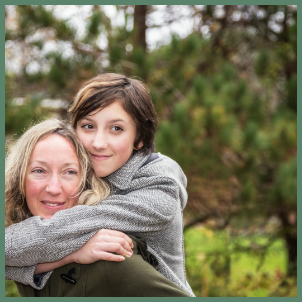I JUST DON’T GET MINDFULNESS
Parenting, in itself, is a remarkable journey, full of challenges and joys. For those of us parents who have the added responsibility of caring for a child with a difference, disability, or challenge, the journey becomes even more unique. In all circumstances as a parent, don’t we all want to have a peaceful mind? Practicing mindfulness can offer an invaluable tool for your toolkit for managing stress, enhancing well-being, and nurturing your own mental health, so you are better equipped to be there for your child.
Misconceptions about mindfulness can stop people from exploring its benefits and how it can help establish a peaceful mind. Beyond the misconceptions, to begin to explore mindfulness, the broad nature can be overwhelming, making it seem the opposite of creating a peaceful mind. Different practices, such as meditation, deep breathing, and body scans, might seem like you need to go back to school or at least take a class to understand mindfulness. This complexity can leave people uncertain about which practice to start with and how to integrate it into their daily lives, feeling as if a peaceful mind isn’t possible, anytime soon.
You can begin to explore your wellness by discovering your place on the happiness continuum. Take the free quiz to uncover where you stand to kick start your journey to a peaceful mind!
MISCONCEPTIONS ABOUT MINDFULNESS
- Mindfulness is a Religious Practice: Although mindfulness has roots in ancient spiritual traditions, it’s not tied to any particular religion. It’s a secular practice that can be embraced by people of all beliefs to develop a peaceful mind.
- Mindfulness is Time-Consuming: Many people believe that mindfulness requires lengthy sessions of meditation, which can be a deterrent for busy parents. However, mindfulness doesn’t allows demand extended periods of time. Even short moments of focused awareness can yield positive results.
- Mindfulness Means Emptying the Mind: Contrary to popular belief, mindfulness doesn’t involve emptying the mind of thoughts. It’s about observing thoughts without judgment and returning to the present moment. It’s not about suppressing thoughts but acknowledging them with compassion.
- Mindfulness is Only about Relaxation: While relaxation is a byproduct of mindfulness, its benefits go beyond that. Mindfulness helps in cultivating resilience, self-awareness, and emotional regulation. All important skills you can share with your child and family.


STILL EASIER SAID THAN DONE
Incorporating mindfulness into our lives offers a holistic approach to managing stress. By nurturing present-moment awareness, emotional regulation, and relaxation, mindfulness equips us with the tools we need to navigate the challenges of modern life with greater calmness and resilience.
When navigating the role of a parent to a child with challenges, the experience can often be a complex interplay of emotions, responsibilities, and uncertainties. In such a context, the effects of stress can be particularly pronounced. When stress strikes, the body’s response is remarkably efficient – heart rate surges, muscles tense in preparation for action, and breathing becomes shallow and rapid.
This is a survival mechanism rooted in our evolutionary past, aimed at either fighting, fleeing or freezing from imminent threats. In the short term, this stress response can be invaluable. But this reaction isn’t conducive to sustained well-being. The body’s response involves the release of stress hormones, most notably cortisol. Research shows chronically elevated cortisol levels, as observed in prolonged stress, can have a significant toll on both physical and mental health.
As parents, we need to allow this to trigger a greater need within us to prioritize and practice mindfulness for our own long-term health and well-being, to have a peaceful mind. So we can live a healthier and happier life to better care for ourselves and the others in our lives. That’s why we incorporated mindfulness into the Grow Your Happy Membership.

Optimism and Happiness is Teachable, Obtainable and Builds Resilience

Deep Breathing
Rooted in ancient traditions and embraced by modern science, mindfulness is a practice that fosters a profound connection between mind and body. At the heart of this practice lies a simple yet transformative tool: deep breathing. This rhythmic, intentional act of drawing breath has the power to engage a physiological process that directly offsets the body’s fight-flight-freeze response, allowing us to find balance and tranquility in the midst of stress.

Incorporating deep breathing into a mindfulness practice is like offering ourselves a lifeline during challenging moments. When stress arises, we have the power to steer our body away from the edge of anxiety by consciously engaging in slow, deep breaths. This simple act is a reminder that we can control our physiological responses to stress and create a buffer zone of calm resilience to increase our health and well-being.
In a world that often overwhelms us, practicing mindfulness through deep breathing is an act of self-empowerment. It enables us to harmonize our thoughts and physical sensations, re-setting our body’s stress response. Through deep breathing, we not only anchor ourselves in the present moment but also cultivate a resilient inner space that helps us navigate life’s challenges with grace and ease for a more peaceful mind.

Deep Breathing
Finding your anchor through the simple process of finding your breath is a foundational practice in mindfulness. It empowers you to stay grounded in the present moment and creates a resilient inner space where you can find peace and stability, regardless of external circumstances.
An anchor, in mindfulness, is a place you can focus on that helps us stay rooted in the now. Just like a ship’s anchor keeps it stable and in one place, finding an anchor within ourselves can provide stability in the ever-changing currents of our thoughts, emotions, and external circumstances.

The act of “finding your breath” involves paying close attention to your breath, observing it as it flows in and out naturally. This focused awareness on the breath becomes your anchor. When you concentrate on the sensation of your breath, the rise and fall of your chest, or the gentle movement of your belly, you create a connection to the present moment. This connection allows you to detach from the constant mind chatter and the distractions of the outside world.
This resilient inner space is like a sanctuary within ourselves, a place where we can find calm and clarity amidst life’s challenges. I acts as a buffer against stress, anxiety, and the chaos of everyday life. When practiced on a regular basis, the more we can have a peaceful mind.
SECRETS TO MINDFULNESS
Mindfulness invites us to embrace the present moment without judgment. Let go of worries about the past or future and focus on the beauty of the present, shared with your child. This cultivates a sense of gratitude for the precious moments you have together. It’s so worth the effort to develop a mindful practice to gain a peaceful mind. Here are some of my secret tips:
- Reduce Frustration: Some beginners may find it challenging to quiet the mind initially. The practice requires patience and persistence to experience its full benefits. Start off with things that resonate with you, and that you enjoy, for short periods of time. Do deep breathing, listen to peaceful music, or really feel how the water hits your skin in the shower.
- Time Commitment: While mindfulness can be practiced in brief moments, consistent practice is key to reaping long-term rewards. Do your best to plan time amidst your busy schedule. An easy way to get started is to pair up your new mindful practice with something you already do on a regular basis. Be mindful when you are sipping your coffee, take a mindful walk feeling each step you take, eat a meal mindfully, savoring the taste.
- Look to Understand the Practice: Do some research to help you understand the practice. Check out the list below and mark what resonates with you to access ideas for personal growth and emotional resilience to obtain a peaceful mind for yourself, your child, and your family.

Mindfulness deepens our connection with ourselves and those around us. It fosters improved emotional intelligence, empathy, and stronger relationships. By learning to be fully present in our interactions, we can nurture deeper connections and a greater sense of community.
If you already have a mindful practice, or don’t want to learn it on your own, and what to practice on a regular basis with others, check out the Grow Your Happy Membership that can really move you forward with your health, well-being, and resilience!


